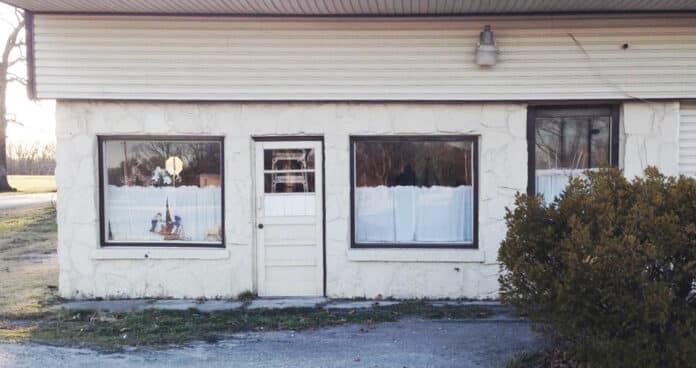
In the quaint city of Fidelity, Missouri stands the first, only and last post office. It is said to be the oldest standing post office building built in its original site of Jasper County, Missouri. According to historical documents, the building was a United States Post Office that served its community from 1855 to 1901 with the last mail carrier being Billy Smith. Reportedly the building is the last standing physical structure of Fidelity built in its original sight.
In the antebellum era, the village of Fidelity was once considered to be one of the most prosperous and progressive villages of Jasper County. The name given to this community was Fidelity, which by definition means demonstration of being faithful. Possibly a characteristic of its founder, William Howard Cloe and his wife, Emily Truelove, and the people of its community. The Cloes donated the land for the Fidelity Cemetery and financed the building of the First Christian Church of Fidelity in 1851.
James Hugh Clow and his wife Lucy Ann Triplet were the first owners of the property which housed the post office and they purchased the land from the United States of America on October 4, 1854, by the 14th President, Franklin Pierce. Census records documented Clow as a farmer and his gravesite at Moss Springs Cemetery in Carthage reads “an old and respected citizen of Jackson Township”. The land was later owned by such distinguished Carthage and Fidelity citizens such as Joel Grubb who owned and operated a blacksmith and casket shop in 1868; by GA Cassill in 1877, a wealthy banker (Bank of Carthage) and real estate developer and founder of the historical Cassil Place in Carthage; Lena Bowman in 1887, who was the Fidelity post mistress along with mail carrier Mr. Wiggins; Bill and Bonnie Hankins who owned and operated Bill and Bonnie’s Groceries (1963 to 1977) and currently Bonnie (Hankins) and the former Albert Hayter.
The structure, which in its orginal dimensions is 40 X 20 feet. The original exterior structure is made of large sandstone rock approximately one foot thick. In a back room of the building, the electricity lines are on the outside of the ceiling which is a characteristic of historical structures built before electricity; the red brick chimney remains once connected to a cast iron pot-bellied stove for heating. Remodeling and repairs have been made through the years which aided in the preservation of the building. An outhouse, glass-paned greenhouse and a large barn once set to the Northwest corner of the property and small living quarters were attached to the back of the property upon purchase in 1963.
The building that facilitated the events of its community has changed names through the years being known as Fidelity Post Office (1855 to 1901), The Fidelity Grocery and Service Station (1952), Saylors Grocery (1958 to 1963) and Bill and Bonnie’s Grocery (1963 to 1977). Though the Bill and Bonnie’s Grocery store closed, the building continued to be owned by Bill and Bonnie Hankins and rented out to antique and craft vendors. Fidelity is geographically located South of Carthage, West of Sarcoxie, North of Diamond and East of Joplin. The land where the post office was built is part of the 827,000 square acres west of the Mississippi that the United States of America purchased from France in the Louisiana Purchase of 1803. The location of the store is at the intersection of Apple Road and Highway 59 in Fidelity (also formerly known as East 20th and Highway 71 Alternate. Highway 71 Alternate in the 1850s was a freight and stagecoach route from Carthage to Neosho. The village was incorporated as a city in 1965 with C. Max Hahnen serving as Fidelity’s first mayor.
This building has watched its community adapt to many life changes: its people being transported by stage coach; it watched the Union soldiers march from Neosho to Carthage during the Civil War and watched its people seek safety and abandon their homes and farms; it watched the burned Fidelity school being rebuilt next to it with remnants from the first church of Fidelity (First Christian Church) and dedicated on August 7, 1922 after the fire of February 4, 1922; the closing of the Fidelity School in 1964 when it saw the last teacher, Angie Royce, conduct the last eighth grade graduation ceremony on May 11, 1964; it stood quiet and somber during the Civil War, World War I and WWII, the Korean War and Vietnam War and all the other tragedies its people sustained, its people watched the television broadcast of the funeral of John F. Kennedy of 1963; it watched in amazement at the first airplanes and automobiles; it had its roadway paved in 1931, Empire Electric installed updated electric poles along Highway 71 Alternate in 1940; and the television broadcast of Neal Armstrong walking on the moon in 1969 at Bill and Bonnies’ Grocery.
Though the building stands idle today, it can still basically be seen as it did in 1855. Aside from the additions, remodels and upkeep and bearing a little paint to hide its wrinkles. The building stands strong today and after nearly 160 years, it still echoes memories of the people it has served and represents the yesterday, today and tomorrow of the community of Fidelity, Missouri.














